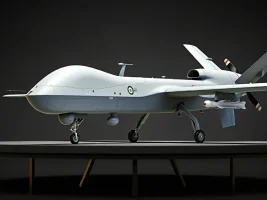- Views: 3K
- Replies: 72

Lockheed Martin, a major player in the global aerospace industry, is actively exploring new avenues to expand its partnership with India. The company seeks to engage India's research, industrial, and academic sectors in cutting-edge technology development.
Randy Howard, Lockheed Martin Aeronautics' Vice President of Global Pursuits, emphasized the company's pursuit of "advanced transfer of technology opportunities" with India. These collaborations hold significant potential in multiple aerospace domains.
One key area is the possible integration of Lockheed Martin's Auto Ground Collision Avoidance System (Auto GCAS) into Indian aircraft. Designed to save lives, this technology automatically prevents aircraft from colliding with the ground, greatly boosting flight safety.
Lockheed Martin is also offering to assist in designing and developing a custom-built cockpit for India's F-21 fighter jet procurement. This 'ground floor' approach would provide India with valuable insights into 5th-generation cockpit systems and human-machine interfaces.
Perhaps most significant is the prospect of collaborative development on India's indigenous 5th-generation fighter program, known as the AMCA. Lockheed Martin's expertise could accelerate India's progress, leading to a more capable fighter aircraft.
Additionally, the company is interested in teaming with India to develop advanced, jet-powered unmanned aerial vehicles (UAVs), further enhancing India's capabilities in this domain.
While discussions are ongoing, this initiative highlights a potential shift in India's drive for self-reliance within the aerospace sector. It also marks a significant deepening of Lockheed Martin's strategic relationship with India.

